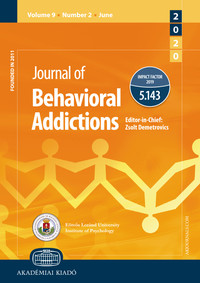Measurement, prevalence, and psychological risk factors associated with addictive food consumption: Development of a new food addiction scale and evidence from a national largescale sample
Measurement, prevalence, and psychological risk factors associated with addictive food consumption: Development of a new food addiction scale and evidence from a national largescale sample
Author(s): Kagan Kircaburun, Hüseyin Ünübol, Gökben H. Sayar, VASILEIOS STAVROPOULOS, Mark D. GriffithsSubject(s): Behaviorism
Published by: Akadémiai Kiadó
Keywords: addictive food consumption; food addiction; psychiatric symptoms; attachment; affect; alexithymia; IRT
Summary/Abstract: Background and aims. To date, a number of studies have investigated the prevalence and correlates of addictive food consumption. However, these studies have mostly relied on models that comprised a narrow range of variables in often small and heterogenous samples. The purpose of the present study was to comprehensively examine the measurement aspects, the prevalence, and the psychological correlates of addictive eating among a largescale national sample of Turkish adults. Method. Participants (N = 24,380, 50% men, Mage = 31.79 years, age range = 18–81 years) completed a battery of tests including the Food Addiction Risk Questionnaire (FARQ), the Brief Symptom Inventory, the Toronto Alexithymia Scale, the Positive and Negative Affect Schedule, and the Experiences in Close Relationships-Revised. Results. According to analyses conducted, the FARQ had a uni-dimensional factor structure. Based on Item Response Theory (IRT) calculated cut-off scores, 2.3% of the participants were at risk of addictive eating patterns, whilst criteria varied in their discriminating ability. The correlates of addictive food consumption were being male, being younger, having lower education, presenting with higher alcohol use, psychiatric symptoms, alexithymia, positive/negative affect, and anxious attachment. Conclusion. These results suggest that a minority of Turkish community are at risk for addictive food consumption and that adverse psychological states promote this problematic behavior.
Journal: Journal of Behavioral Addictions
- Issue Year: 9/2020
- Issue No: 3
- Page Range: 836-852
- Page Count: 17
- Language: English

